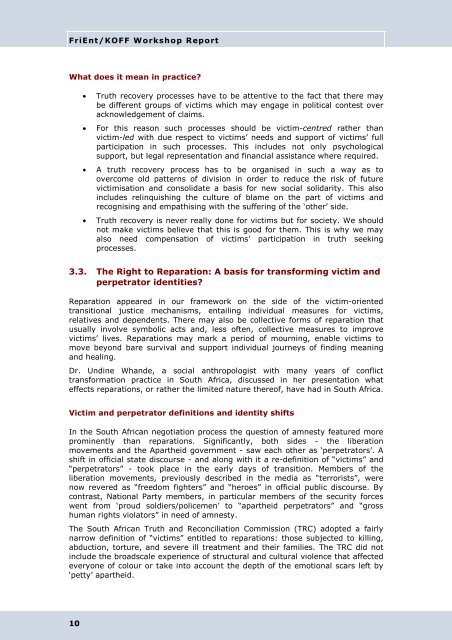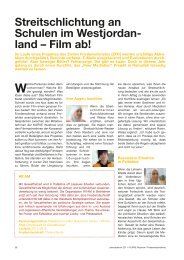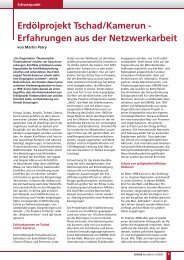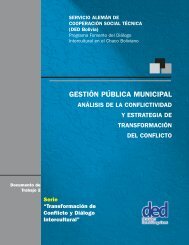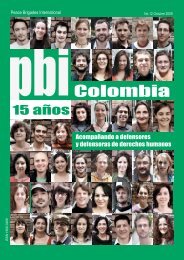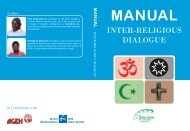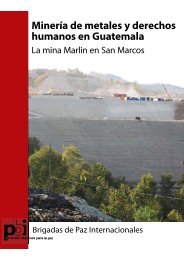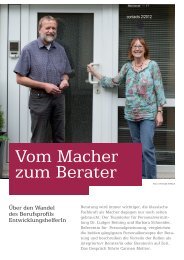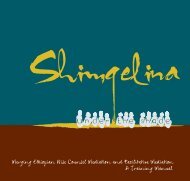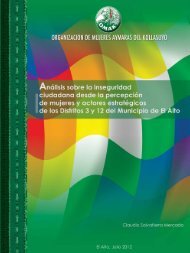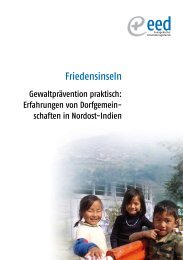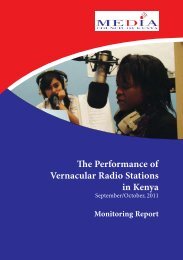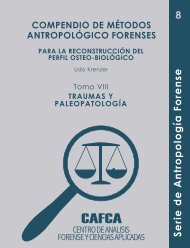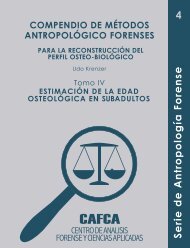Engaging with Victims and Perpetrators in Transitional ... - FriEnt
Engaging with Victims and Perpetrators in Transitional ... - FriEnt
Engaging with Victims and Perpetrators in Transitional ... - FriEnt
- No tags were found...
You also want an ePaper? Increase the reach of your titles
YUMPU automatically turns print PDFs into web optimized ePapers that Google loves.
<strong>FriEnt</strong>/KOFF Workshop ReportWhat does it mean <strong>in</strong> practice?• Truth recovery processes have to be attentive to the fact that there maybe different groups of victims which may engage <strong>in</strong> political contest overacknowledgement of claims.• For this reason such processes should be victim-centred rather thanvictim-led <strong>with</strong> due respect to victims’ needs <strong>and</strong> support of victims’ fullparticipation <strong>in</strong> such processes. This <strong>in</strong>cludes not only psychologicalsupport, but legal representation <strong>and</strong> f<strong>in</strong>ancial assistance where required.• A truth recovery process has to be organised <strong>in</strong> such a way as toovercome old patterns of division <strong>in</strong> order to reduce the risk of futurevictimisation <strong>and</strong> consolidate a basis for new social solidarity. This also<strong>in</strong>cludes rel<strong>in</strong>quish<strong>in</strong>g the culture of blame on the part of victims <strong>and</strong>recognis<strong>in</strong>g <strong>and</strong> empathis<strong>in</strong>g <strong>with</strong> the suffer<strong>in</strong>g of the ‘other’ side.• Truth recovery is never really done for victims but for society. We shouldnot make victims believe that this is good for them. This is why we mayalso need compensation of victims’ participation <strong>in</strong> truth seek<strong>in</strong>gprocesses.3.3. The Right to Reparation: A basis for transform<strong>in</strong>g victim <strong>and</strong>perpetrator identities?Reparation appeared <strong>in</strong> our framework on the side of the victim-orientedtransitional justice mechanisms, entail<strong>in</strong>g <strong>in</strong>dividual measures for victims,relatives <strong>and</strong> dependents. There may also be collective forms of reparation thatusually <strong>in</strong>volve symbolic acts <strong>and</strong>, less often, collective measures to improvevictims’ lives. Reparations may mark a period of mourn<strong>in</strong>g, enable victims tomove beyond bare survival <strong>and</strong> support <strong>in</strong>dividual journeys of f<strong>in</strong>d<strong>in</strong>g mean<strong>in</strong>g<strong>and</strong> heal<strong>in</strong>g.Dr. Und<strong>in</strong>e Wh<strong>and</strong>e, a social anthropologist <strong>with</strong> many years of conflicttransformation practice <strong>in</strong> South Africa, discussed <strong>in</strong> her presentation whateffects reparations, or rather the limited nature thereof, have had <strong>in</strong> South Africa.Victim <strong>and</strong> perpetrator def<strong>in</strong>itions <strong>and</strong> identity shiftsIn the South African negotiation process the question of amnesty featured moreprom<strong>in</strong>ently than reparations. Significantly, both sides - the liberationmovements <strong>and</strong> the Apartheid government - saw each other as ‘perpetrators’. Ashift <strong>in</strong> official state discourse - <strong>and</strong> along <strong>with</strong> it a re-def<strong>in</strong>ition of “victims” <strong>and</strong>“perpetrators” - took place <strong>in</strong> the early days of transition. Members of theliberation movements, previously described <strong>in</strong> the media as “terrorists”, werenow revered as “freedom fighters” <strong>and</strong> “heroes” <strong>in</strong> official public discourse. Bycontrast, National Party members, <strong>in</strong> particular members of the security forceswent from ‘proud soldiers/policemen’ to “apartheid perpetrators” <strong>and</strong> “grosshuman rights violators” <strong>in</strong> need of amnesty.The South African Truth <strong>and</strong> Reconciliation Commission (TRC) adopted a fairlynarrow def<strong>in</strong>ition of “victims” entitled to reparations: those subjected to kill<strong>in</strong>g,abduction, torture, <strong>and</strong> severe ill treatment <strong>and</strong> their families. The TRC did not<strong>in</strong>clude the broadscale experience of structural <strong>and</strong> cultural violence that affectedeveryone of colour or take <strong>in</strong>to account the depth of the emotional scars left by‘petty’ apartheid.10


